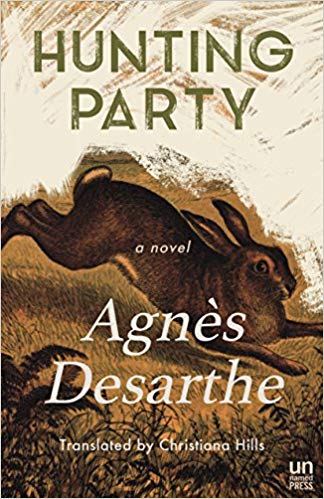
What's your favorite work in translation? That's the question that launches this summer's NBCC Reads series, which draws upon the bookish passions of NBCC members and honorees. (Previous NBCC Reads here.) Tell us why you love the book (in 500 words or less) be it a new one, like Sayaka Murata’s quirky little novel, Convenience Store Woman, or something a bit older, such as Stefan Zweig’s evocative memoir, The World of Yesterday. The deadline is August 3, 2018. Please email your submission to NBCC Board member Lori Feathers: lori@interabangbooks.com
Agnès Desarthe’s Hunting Party (Unnamed Press; tr. Christiana Hills) is a slim novel bursting with story, and like any good fairytale it achieves both menace and charm. Set in an unnamed village in France, the novel follows Tristan, young and fairly recently married to Emma, as he sets off to go hunting with three local men. Tristan and Emma are new to the village, and Emma, a writer, believes Tristan’s invitation to the hunt is a sign they might finally be integrating. Tristan is no hunter, but he is good-natured and kind, and he is willing to rise to the occasion despite the very obvious differences in temperament, experience, and character between him and the other men. He even attempts to hunt but ends up wounding his animal instead. Not wanting to be caught out, he hides the wounded rabbit in his bag—and the first of the novel’s magic begins, as Tristan and the animal begin a subtly accomplished philosophical dialogue on life and love.
Initially it seems that Hunting Party will be a lighthearted portrait of a generational and urban vs. city clash. The book succeeds already on this level, with wit and a certain perceptive satire. However, a darker, more dangerous tone creeps onto the pages as the story unfolds and the weather turns, as the men move deeper into the forest and we learn more about Tristan’s past and current life: the death of his fragile mother when he was still young, his grief-inflected sojourn to England at the expense of a benefactor, how he met Emma and her often dominating, even aggressive behavior.
An accident strikes the small party, a thoughtless, even absurd accident, and the four men will be tested. Through it all, Tristan reflects on the life that has brought him to this particular moment while the wounded captive in his bag quite rightly comments on the absurdity of humankind. As a storm threatens and then hits, the novel’s undercurrents of masculinity-in-question, female violence, and the power and mystery of nature rise to the surface and become a flood. The result, managed splendidly by the award-winning Desarthe, is superb and even carnivalesque.

